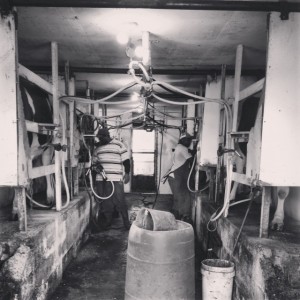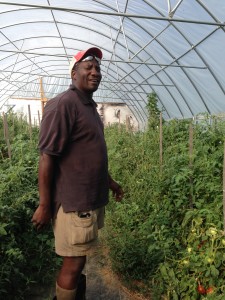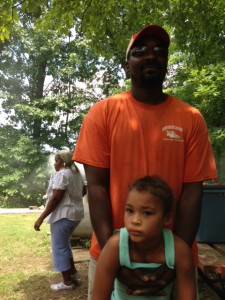For my Independent Fifth Day, I wanted to experience the rural side of Kentucky. FoodWorks Louisville looks closely at the urban food system, while the Middlebury group is getting a well-rounded understanding of the rural food systems in Vermont. However, you cannot understand the urban food system in Louisville without looking at where that food is coming from in the countryside.
I visited Barbour Farms in Hart County, Kentucky. The farm is owned by fourth generation African American farmers, with three generations of the Barbour family currently living on the land. During my day with them, I wanted to learn about the past, present, and future of the farm while also exploring how the family envisions their role in improving access to fresh, local food in Louisville for people of all socio-economic statuses.
Barbour Farms is located on approximately 150 acres of land, where they raise beef cattle, dairy cows, pork, poultry, vegetables, tobacco, and soilage for feed, along with several fruit and nut trees. Their meat is processed by Fairplay Meat Processing and another processor in Bardstown, KY. Their dairy is Grade A dairy sold through Dairy Farmers of America. Andre Barbour is now in charge of the vegetables on the farm. Their current markets for the food from the farm are mainly their CSA program and a permanent farmers market in Nashville, Tennessee. They are starting to break into Louisville markets by selling to the organization New Roots for their Fresh Stops, which provide fresh food to people in low-income areas.
I asked Andre how the farm has changed in the past several years. His answer was “So much.” When his father was managing the land, the farm was mainly for tobacco. When Andre returned from college and work, he convinced the family to diversify the land more since tobacco is no longer very profitable. Now, one acre of vegetables can be five to six times more profitable than one acre of tobacco. There are still eight acres of tobacco that the father is in charge of, but most of the remaining land is managed by the children. They are in the process of modernizing their techniques and experimenting with a wide range of activities to see what will support their farm the best.

One interesting aspect of Barbour Farms was the partnership between themselves and four other farmers all within an hour of each other. They provide for their CSA boxes together, so some farmers can provide meat and dairy, while others provide the vegetables, and a third provides honey and cheese, for example. A great quote from one of the partners, TJ, was “You can’t run a CSA by being a single farmer…Community supported agriculture?! But you’re only one farm!” They were striving to form a community of providers alongside their community of consumers.
We had a conversation about how they envisioned changing the food system in Louisville so that there is more equitable access to the food coming from farmers like them in rural areas. They talked a lot about providing food in bulk to NGOs in Louisville. If organizations are buying large quantities at one time, both the farmer and buyer can benefit. The farmer will be guaranteed a large sale, while the buyer receives a lower price. They were critical of farmers at farmers markets who are trying to make the maximum profit off of each individual fruit or vegetable. They also see a need for increased food literacy, which would take the form of community gatherings that would bring together chefs and farmers. The farmers would provide the fresh food, while the chefs would be cooking dishes with the products beside the farmers. It sounded just like what New Roots is doing, but a bigger scale is needed to reach everyone in the food deserts of Louisville.

Andre and TJ were asking me where I see myself in ten years. I flipped the question onto them to ask where they saw themselves in ten years and who they wanted to be selling to at that time. TJ immediately responded with “Walmart!” We chuckled, but then he told us he was serious about that answer. He believes Walmart is going to lead the industrial food system into fresh fruits and vegetables and be the main way that people are going to have access to fresh food. Andre responded with “Doing what we are doing with supplying to New Roots.” I asked what was attractive to him about New Roots, and he said that he enjoyed the feeling when he delivered food to the Fresh Stops and meeting the community members who were excited and interested to see their food and see who was producing it.
It was refreshing to meet the farmers who have been growing the food that I have been eating from the Fresh Stop shares this summer. Also, I enjoyed seeing a family-owned farm that was rooted in place and space, but also striving to modernize and provide affordable fresh food to their fellow Kentuckians in urban areas like Louisville.

